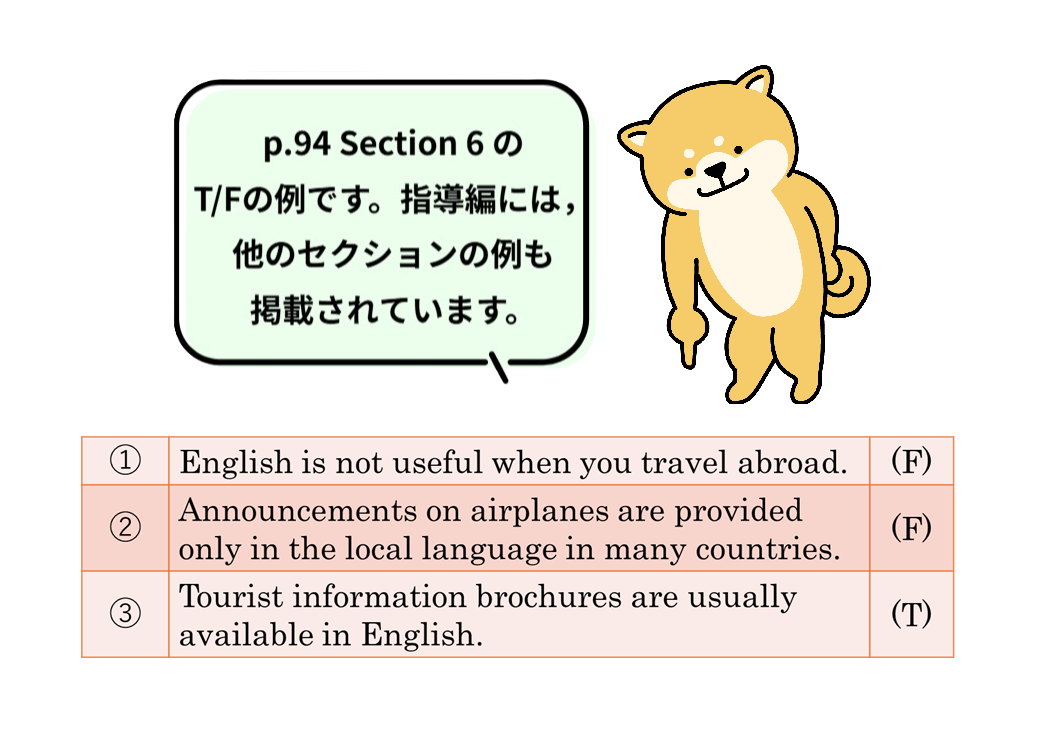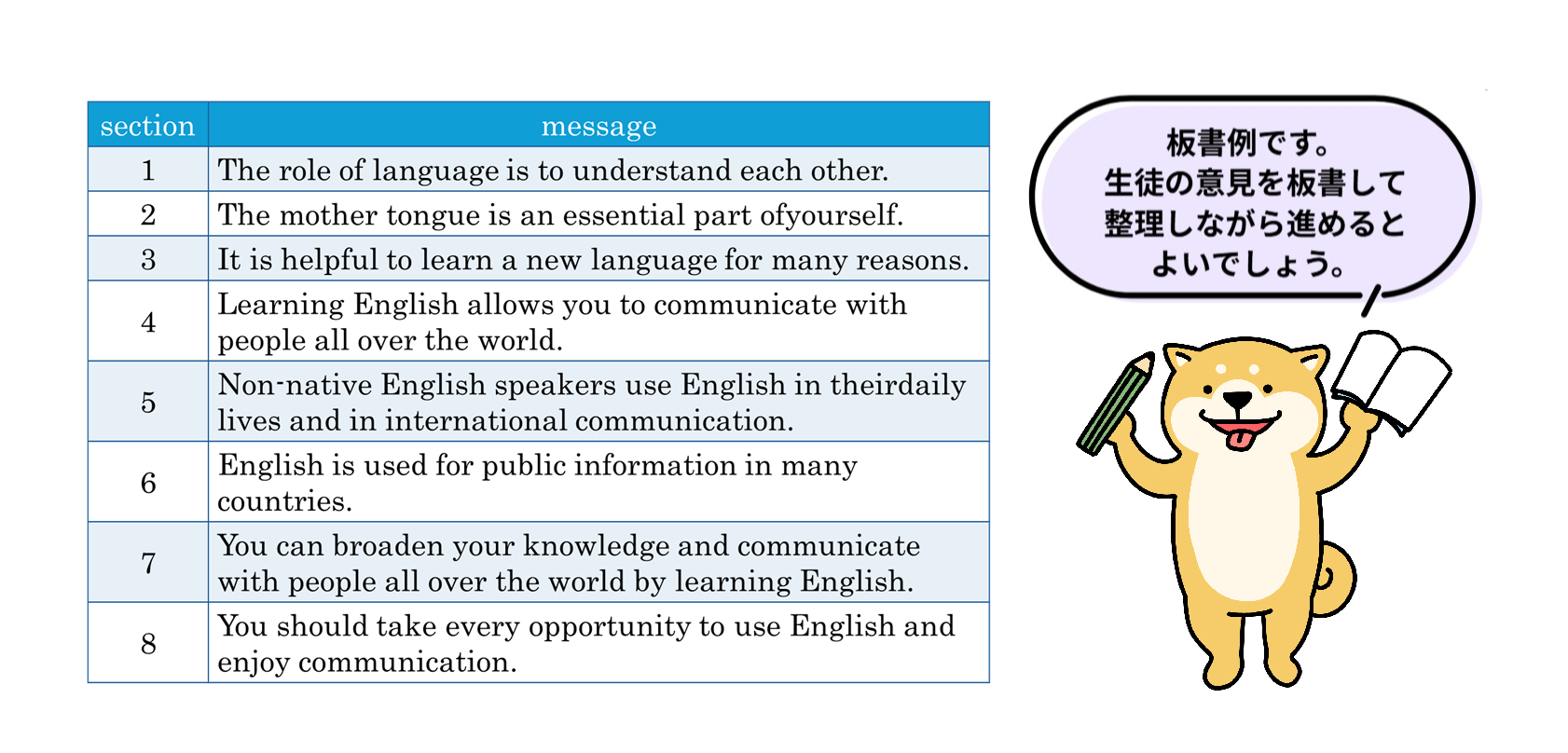���Ƃ̃����|�C���g
����̖����C�p����w�ԗ��R
����ޓ��� Oral IntroductionBefore Reading�ip.92�j
�@�����ł́C����ɂ��ď����ꂽ���͂�ǂ�ŁC���̗v�|�𑨂��邱�Ƃ�ڕW�ɂ��Ă��܂��B
�@p.92���J���āuBefore Reading�v���m�F���C�Ȃ��p����w��ł��邩�ɂ��čl�������܂��B
�y��b��z
T�F Have you thought about why you are studying English?
�@�@Discuss with your partner, and list as many reasons as you can.
�i�y�A�ɂȂ�C�p�[�g�i�[�Ƙb�������B�j
T�F How many reasons were you able to list?
�@�@Now, gather in groups of six.
�@�@Share your idea and make a list of your group.
�i�O���[�v�Řb�������B�j
T�F Do you have more reasons than you had when you were in pairs?
�@�@Now, discuss again in your group and list the reasons in order of importance.
�@�@Which reason is the most important of all?
�@�@Which one is more important than the others?
�i�O���[�v�Řb�������B�j
T�F Share your list with us.
�@�@Which reason comes number one in your list?
�@�@Which comes second?
S1�F In our group, the most important reason is to communicate with people from all over the world.
�@�@The second reason is to take the high school entrance exam.
S2�F The most important reason to study English is to use it at work in the future.
�@�@The second reason is to make many friends around the world.
T�F Interesting. Many people would like to use English as a tool for communication.
�@�@And you know any way you need English for high school or for your work in the future.

��Reading ����Section 5�ip.94�j
�@p.94 �i��5��ǂ݂܂��B��x�����ł͂Ȃ��C������ǂ܂���悤�H�v���܂��傤�B
��1��ځF�����̊m�F�i���̂P�j
�i1�j�{����ǂ݁CT/F �ɓ�����悤�w�����܂��B
T/F �̗�j
�@�@ English is used only by native speakers of English. (F)
�@�A The mother tongue of the people in the Philippines and India is English. (F)
�@�B The language used in the meeting will probably be English if Japanese, Korean, and Chinese people are at the meeting. (T)
�i2�j���k�̓y�A�ɂȂ�C�������킹�����܂��B���̌�C���t�̓N���X�S�̂œ��������L���܂��B������ False �̏ꍇ�C�ǂ̕���������Ă��邩�m�F���܂��B
�y���b��z
T�F Read Section five.
�@�@And answer these True or False questions.
�i�e���Ŗ{����ǂ݁CT/F �Ɏ��g�ށB�j
T�F Now, let's check the answers.
�@�@Talk with your partner and check the answers.
�i�y�A�ɂȂ�C�p�[�g�i�[�Ɠ������킹������B�j
T�F OK. Let's check the answers together.
�@�@Number one. �gEnglish is used only by native speakers of English.�h
�@�@Is it true or false?
S1�F It's false.
T�F Why?
S2�F Non-native speakers of English living in the U.K. and in the U.S. use English in their daily lives.
T�F Great. Do you know what percentage of people living in the U.S. are non-native speakers of English?
S3�F I don't know. 5%?
T�F It is said about 22% of people living in the U.S. are non-native speakers of English.
�@�@About 10% in the U.K., about 14% in Canada, and about 22% in Australia are non-native speakers of English.
�@�@Number two....�i���l�ɑ�����j

�����W�I����p.95
�@�{���̗v�_�𑨂��銈���Ɏ��g�݂܂��B
�@�e�i���́C�v�_�Ƃ��̗v�_���x�����ŏ�����Ă��܂��B�e�i���̗v�_���P���ł܂Ƃ߁C�������������m�F���邱�ƂŁC�v�_�𑨂������܂��傤�B
�y���b��z
T�F Today, we read Section seven and eight.
�@�@Each section has a message that is the most important thing in the passage.
�@�@What's the message of each section?
�@�@Write it in one sentence.
�@�@The message can be picked up from the text, or you can write a sentence in your own words.
�i�i��7�ƒi��8�̗v�_���l���ăm�[�g�ɏ����B�j
T�F Share your sentences with your partner.
�i�y�A�ɂȂ�C�p�[�g�i�[�Ƌ��L����B�j
T�F What do you think is the message of section seven?
S1�F You can broaden your knowledge and communicate with people all over the world by learning English.
T�F Good. What's the message of section eight?
S2�F It's important to be exposed to English used by native speakers.
S3�F Non-native speakers' English can be your role model, too.
T�F So, you can learn both from native and non-native speakers.
S4�F You should take every opportunity to use English and enjoy communication.
T�F That's the key to success in learning English.

����މ����p�ꌗ�̉p��̓����L���O
�@�p��͍��ۓI�ȃR�~���j�P�[�V������i�Ƃ��čL���g���Ă���C��p�ꌗ�̍��X�ł����̏d�v�������܂��Ă��܂��B
�@�X�C�X�ɂ��� EF Education First �́C���E116�����E�n��̉p��͂�]�������uEF�p��\�͎w���iEF EPI�j�v�\���Ă���C�p��͂�5�i�K�ɕ��ނ��Ă��܂��B
�@����2024�N�łł́C�I�����_���ł������p��͂������Ƃ���C������9���ȏオ�p���b����Ƃ���Ă��܂��B���̗v���Ƃ��ẮC�c��������[�������p�ꋳ����Ă��邱�Ƃ�e���r�ԑg�ȂǓ���I�ɉp��ɐG��Ă��邱�ƂȂǂ��������܂��B�����ŏ�ʂɓ����Ă���̂��C�m���E�F�[�C�V���K�|�[���C�X�E�F�[�f���C�N���A�`�A�ł��B
�@�������Ȃ���C���E�S�̂ł͉p��͂��ቺ�X���ɂ���C��60���̍��őO�N���X�R�A��������܂����B���ɃA�W�A�ł͒ቺ�������ŁC���{��92�ʂƒႢ�ʒu�ɗ��܂��Ă��܂��B���̈���Œ����ł͎�҂𒆐S�ɉp��͂����サ�Ă���C�A�t���J�ł͏����̉p��͂������C�������������D�ʂȒn��ƂȂ��Ă��܂��B
�@�p��͂͌o�ρC����C�Z�p�v�V�ȂǂƖ��ڂɊ֘A���Ă���C���I�@�ւ̐E���͖��Ԋ�Ƃ̐E�����p��͂��Ⴂ�X���ɂ���܂��B�����̌��ʂ���C�p��͂̕ω��ɂ͒n��C����C���ʂ̈Ⴂ���e�����Ă��邱�Ƃ��킩��܂��B

�yLet's Read 2�z
English Is a Tool for International Communication
�i���ȏ�p.92�`96�j
�A���P�[�g
��낵����L���ɂ��Ă̂��ӌ��������������������B
Q1�܂���Q3�̂����ꂩ����͂����͂��������B

